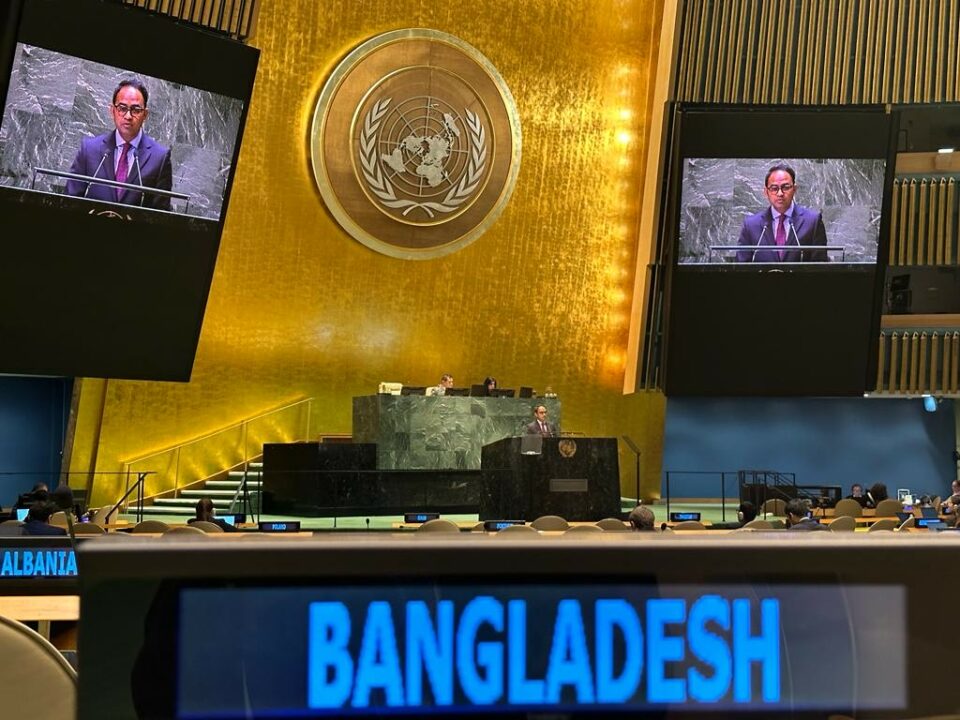Mr. President,
Thank you for convening this annual debate, specially at a time, when we have, to our collective dismay, revealed the Security Council’s glaring ineffectiveness in maintaining international peace and security.
Allow me to begin by commending Ambassador Alexander Marschik, Permanent Representative of Austria, and Ambassador Tareq M. A. M. Albanai, Permanent Representative of the State of Kuwait for their excellent stewardship of the IGN in last session. I also congratulate them on their re-appointment as the Co-chairs of this important process.
We are confident that under their able leadership we will be able to instill new life in this process.
Mr. President,
The Security Council, which has primary responsibility for the maintenance of international peace and security, has not lived up to its expectations. The persistent inaction of the Security Council in the face of the ongoing atrocities in Gaza is a stark reminder for immediate and comprehensive reform of the Security Council. The Security Council’s utter failure to fulfill its primary responsibility has had devastating consequences for the Palestinian people, who have endured years of violence and oppression.
The Security Council’s inaction in Gaza is not an isolated incident. It is a pattern that has been repeated time and again in conflicts around the world. The Council’s failure to act decisively to prevent the tragic loss of innocent lives, particularly children and women is a blatant affront to the very principles upon which this organization was founded.
The Council’s current structure, rooted in the post-World War II era, no longer reflects the realities of the 21st century.
Mr. President,
Almost 18 years have passed since world leaders expressed their support for early reform of the Council as an essential element in the overall reform of the Organization and 14 years since the launch of the intergovernmental negotiations process. Our mandate is to deliver a solution on Council’s reform, not to just continue our annual repetition of well-known positions.
We need to reform the Security Council to make it more transparent, inclusive, representative, accountable and effective to take on the challenges of the 21st century. We cannot and should not wait indefinitely for the reform of the Council. We must do something now, and something that is concrete.
Allow me to highlight few points in this regard:
First, there is no debate on the need for the Security Council reform. We all agree that the Council’s membership and structure is not in tune with the current realities on the ground. In order to be fully representative, relevant, effective, democratic, transparent and fit for purpose, it must be reformed.
We reiterate that an expansion of the Security Council in both permanent and non-permanent categories is indispensable to making this body more representative, legitimate and effective.
In this context, we wish to underscore the significance of ensuring that new permanent members remain committed to upholding the principles of the UN Charter and IGN process should play a vital role in achieving this assurance.
Second, enlarged Council must allow for fair and equitable representation of all regional groups, as well as cross regional balances. Historical injustice done to certain regions need to be redressed as a matter of priority. We must ensure that certain underrepresented regions, such as, Africa, Asia-Pacific and Latin America have due representation in the enlarged Council. Furthermore, due consideration must also be given so that the developing countries, including small island developing States have an opportunity to serve in the Council.
Third, a comprehensive reform of the Council’s working methods particularly the use of the veto is required taking into account the current geopolitical realities. My delegation will join consensus that emerges on the veto question, however, required measures should be taken to ensure its judicious application so long as it exists, by limiting its application only for certain compelling situations such as genocide, crimes against humanity, and war crimes. My delegation supports the UNGA Resolution 76/262, which has created more accountability over the use of the veto. In this regard, we also reiterate the necessity of inclusivity and in-depth dialogue among member states.
Improving the Council’s working method will also make our efforts more synergized and efficient. The IGN process must explore additional avenues to enhance the accountability of an enlarged Security Council to the UN membership.
Finally, there cannot be more significant reasons than the current global realities that dictate the urgency of the reform of the United Nations. We would remind that the IGN work should also be linked to other processes for UN reform such as the Ad-hoc Working Group on General Assembly Revitalization.
While there is divergence on some key reform issues, there is also a strong convergence among Member States that the Council must fulfill its responsibilities, as outlined by the Co-Chairs’ Elements Paper. My delegation will continue to promote approaches for a meaningful Council reform that enjoy widest possible political acceptance.
To that end, the forthcoming Summit of the Future presents us an opportunity to, among other things, attain tangible outcomes regarding Security Council reform. Let’s us seize this opportunity during the upcoming IGN cycle to formulate precise language for incorporation into the Future Pact.
Mr. President,
Let me conclude by reminding that if we fail to do the most needed reforms now, we may not need to do it ever.
I thank you.

